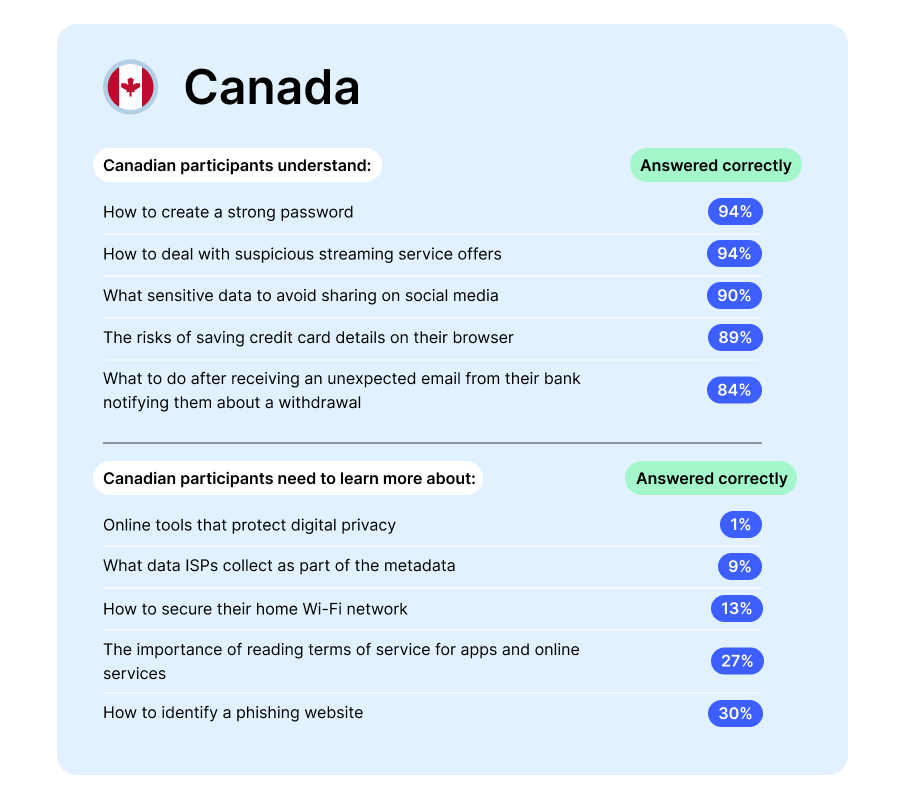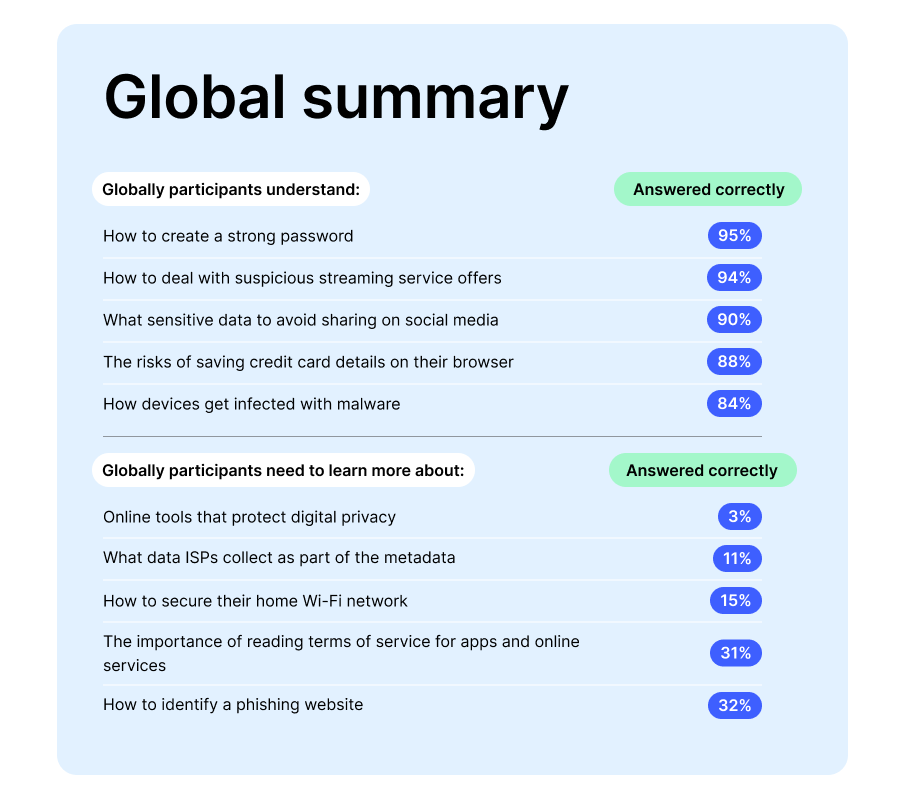National Privacy Test: Canadians share fourth place with several other countries
The National Privacy Test is a global survey that allows people worldwide to evaluate their cybersecurity and digital privacy awareness. The most recent results show that, while global cybersecurity awareness is declining, Canadian participants have some of the highest scores and are among the top five best-performing countries. Let’s look at the most interesting insights.
Table of Contents
Table of Contents
About the National Privacy Test
The National Privacy Test is an international survey designed to help people everywhere find out how much they know about online security and privacy. The survey consists of 22 questions on various cybersecurity-related topics, such as daily digital habits, privacy awareness, and cybersecurity threats.
Thousands of participants from 175 countries worldwide have participated in the survey this year. We’ve analyzed the 25 markets with the most responses — and the results show some fascinating differences between the countries.
Each country has a National Privacy Test score based on how well its participants performed. Our data analysts have also categorized participants into four cyber personas based on the number of correct answers.
Before we dig deeper into the findings, let’s clarify how we calculate the National Privacy Test (NPT) score and determine cyber personas.
How we calculate NPT scores
The NPT score is calculated using the averages of the three other scores: daily digital life, privacy awareness, and digital risk tolerance. Because the test has 22 questions, each question has a value of 4.5%. The more questions a respondent answers correctly in each category, the higher their NPT score.
What are cyber personas?
Cyber personas are participant groups representing different levels of cybersecurity knowledge and skills based on their National Privacy Test scores. Here are the personas and the corresponding NPT scores:
- Cyber Wanderer. Cyber Wanderers have the lowest NPT scores (1-24%) and don’t know enough about digital security and privacy to stay safe online.
- Cyber Tourist. Cyber Tourists have average NPT scores (25-49%) and know more than Cyber Wanderers — but not enough.
- Cyber Adventurer. Cyber Adventurers show a relatively good understanding and awareness of online security and privacy issues. Their NPT scores are between 50% and 74%.
- Cyber Star. Cyber Stars are the top-performing participants with excellent cybersecurity awareness, knowledge, and skills. Their NPT scores are between 75% and 100%.
What do the test results show?
The National Privacy Test shows Canadians are well-versed in cybersecurity and digital privacy. Let’s dig into the findings.
What are the key takeaways?
Overall, Canadian participants know a lot about cybersecurity and digital privacy. They have the second-highest daily digital life score after Singapore — and the best score among English-speaking countries. Here are the main insights:
- Canadians performed best on questions about online risks and how to avoid them (71%) — but struggled when asked about the tools for staying safe online (56%).
- Most Canadian respondents know how to create strong passwords (94%), which is crucial in protecting accounts from cybercriminals.
- Canadians also know how to deal with suspicious streaming service offers. When asked what they’d do if they saw a streaming service subscription on eBay for less than its official price, 94% said they wouldn’t buy it because these accounts were probably acquired illegally.
- Most Canadian respondents understand it’s best to share as little as possible on social media platforms like Instagram and Facebook (90%). Making information like your location or personal details visible to strangers poses many risks — and people in Canada are aware of that. You never know who might use this information for malicious purposes — whether it’s cyberbullying or identity theft.
- Canadians also are rightly cautious about saving their credit card information on their browsers. When asked whether they would save payment information after buying something online, 89% said they wouldn’t.
- Though Canadian respondents score highly on most questions, only 1% of respondents know what online tools to use for digital privacy protection. Similarly, a small proportion (9%) know what data internet service providers collect as part of the metadata. ISPs track users in many ways and can access a lot of information about you — from the files you download to online searches.

Cyber personas in Canada
Like in most other countries, seven out of 10 Canadian (72%) respondents are Cyber Adventurers. Only 0.2% of Canadian participants are Cyber Wanderers (the group that barely knows anything about cybersecurity).
What are the major changes since 2021?
Compared to 2021, more Canadians know how important it is to read the terms of service of apps and online services (18% in 2021 vs. 27% in 2023). Ignoring the small print may lead to you unwittingly giving away huge amounts of personal information to companies. Even though these percentages are relatively low, awareness of these issues appears to be growing.
Similarly, more people this year know how to deal with phishing attacks, that is, cybercriminals telling you they’ve infected your device with malware and demanding money (51% in 2021 vs. 58%in 2023).
An overview of global results
Overall, the study reveals that global privacy and cybersecurity awareness is declining. This year’s total score was 61 points out of 100 (compared to 64 last year).
According to Marijus Briedis, the CTO of NordVPN, this decline isn’t surprising, considering the increasing complexity of online threats and the growing number of cybersecurity solutions.
“I think there are a few reasons why cybersecurity knowledge is declining globally. The first and most important one might be the sheer volume of online activities and digital interactions that people engage in daily. Our previous research showed that people globally spend more than 27 years of their lifetime online. Secondly, as technology continues to advance, cybercriminals also adapt their tactics, making it challenging for the average user to keep up. Also, there is a common misconception that cybersecurity is solely the responsibility of service providers,“ says Briedis.

The survey shows that people perform best in questions about online risks and how to avoid them (73%) and worst in online tools and safety practices (52%).
Globally, people know how to create strong passwords, with 95% answering this question correctly. Most people also know what sensitive data to avoid sharing on social media (90%) — and about the risks of saving credit card details on their browser (88%).
However, globally, only a small percentage (3%) of people know about the tools that protect your digital privacy, and only 11% know what data ISPs collect as part of the metadata.
Similarly, not enough people understand the importance of reading the terms of service for apps and online services (31%). However, the good news is that this metric is increasing faster than others (only 21% of respondents paid attention to terms and conditions in 2021).
Looking at the cyber personas, only 1% of all participants are Cyber Wanderers with very little cybersecurity knowledge. Fifteen percent of all respondents globally are Cyber Stars.
Interestingly, people aged 30 to 54 have the highest scores and are most likely to be Cyber Stars. The results suggest that younger people and those aged over 54 need to brush up on their cybersecurity skills and improve their online privacy habits.
Globally, the top-performing countries for cybersecurity and privacy awareness are:
- Poland and Singapore (NPT = 64)
- Germany and the United States (NPT = 63)
- The United Kingdom, Austria, and Portugal (NPT = 62)
View the National Privacy Test report for more global insights and country comparisons.
Want to take part in the National Privacy Test and see how many answers you can get right? Complete the survey on the official National Privacy Test website.
Methodology
The National Privacy Test is an open-access survey anyone can complete. In 2023, the survey had 26,174 respondents from 175 countries. The National Privacy Test is not nationally representative (i.e., no quotas on age or gender were set). The report we’re referring to in the blog post uses data from the survey collected until 19 July 2023. Any differences between the report and the webpage results are due to participants taking the survey after 19 July.
Want to read more like this?
Get the latest news and tips from NordVPN.
